When to Consider a Sphynx Cat: Lifestyle Compatibility
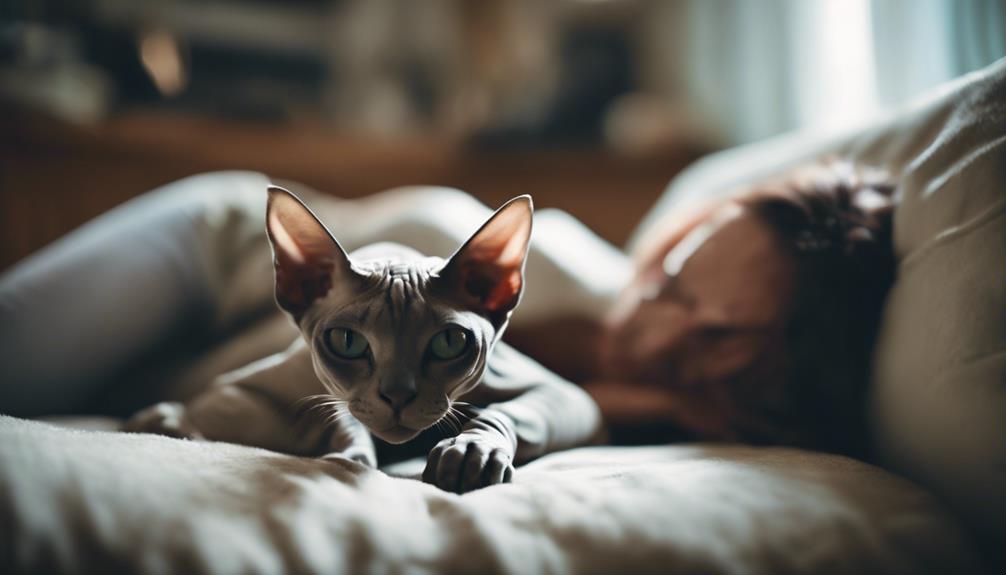
Sphynx cats are known for their unique appearance and friendly personalities. They are affectionate and social creatures that thrive on human interaction. Potential owners should consider their lifestyle before bringing a Sphynx cat into their home. These cats require regular grooming to keep their skin healthy and free of oils. Additionally, they are sensitive to temperature changes and may need extra warmth in colder climates. Sphynx cats also have high energy levels and enjoy playing and exploring their environment. It is important to provide them with plenty of toys and opportunities for exercise. Overall, Sphynx cats can make wonderful companions for individuals or families who are willing to meet their specific needs.
Daily Routine Assessment
Assessing one's daily schedule is crucial when considering the addition of a Sphynx cat to the family. Sphynx cats require a daily routine that can accommodate their grooming, playtime, and companionship needs. These cats need regular grooming sessions, including bathing and ear cleaning, due to their lack of fur. Additionally, providing a warm environment is essential as Sphynx cats crave warmth to compensate for their missing coat.
In terms of dietary needs, owners must consider if they can provide multiple smaller meals throughout the day to meet the cat's requirements. Mental stimulation is also vital for Sphynx cats, so evaluating if there's enough space for climbing structures and toys is necessary. Lastly, companionship is key for these social cats, so ensuring that there's enough time for bonding and interaction daily is important. By carefully assessing one's daily routine against these criteria, one can determine if they're prepared to meet the needs of a Sphynx cat effectively.
Living Environment Evaluation
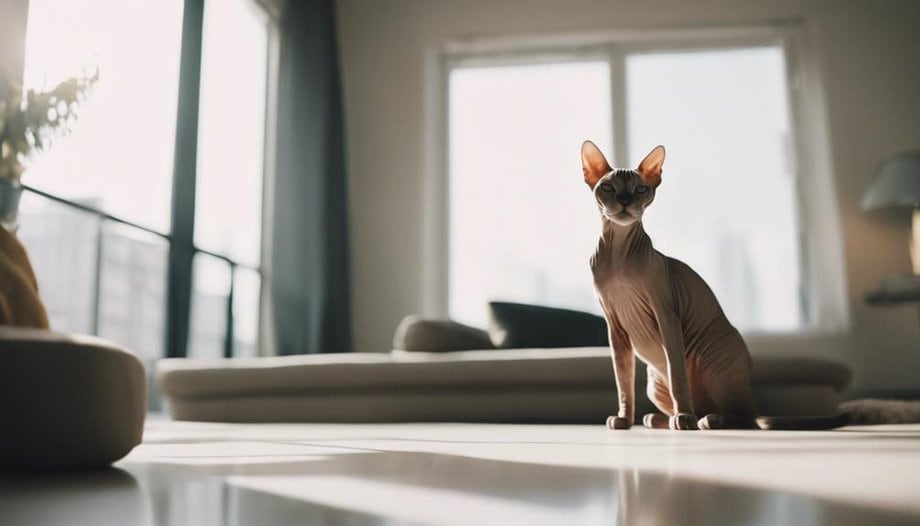
When considering a Sphynx cat, it's crucial to evaluate the living environment thoroughly. Home space assessment is essential to ensure the cat has enough room to move freely.
Temperature considerations, especially avoiding extreme cold, are vital for the well-being of a Sphynx cat.
Allergies and sensitivities should also be taken into account when creating a suitable living environment for these unique feline companions.
Home Space Assessment
To evaluate the suitability of a living space for a Sphynx cat, consider factors such as temperature consistency, climbing opportunities, and draft-free areas. Since Sphynx cats are indoor pets, it's crucial to provide a warm environment due to their warmth-seeking nature.
They thrive in homes with spaces for climbing and exploring to satisfy their active and curious personalities. Ensuring the living space is draft-free is essential to keep them cozy and comfortable.
Additionally, Sphynx cats are social creatures that enjoy the company of their human companions, making them a good fit for households where they can receive attention and interaction regularly. Assessing these aspects will help determine if your home is compatible with the lifestyle needs of a Sphynx cat.
Temperature Considerations
Considering the temperature requirements of Sphynx cats is essential when evaluating their living environment for optimal comfort and well-being. Sphynx cats, sensitive to cold temperatures due to their lack of fur, thrive in warm indoor settings. To ensure their well-being, it's crucial to provide warm bedding, maintain a draft-free environment, and monitor room temperature levels.
Owners can enhance the comfort of Sphynx cats during colder seasons by offering heated cat beds or blankets to help regulate their body warmth. Preventing exposure to extreme cold or heat is vital in caring for Sphynx cats, as they rely on a stable and controlled environment to stay cozy and content.
Allergies and Sensitivities
Temperature considerations are vital when evaluating the living environment for Sphynx cats, and understanding their allergies and sensitivities is equally important for creating a suitable home setting. Sphynx cats are often recommended for individuals with allergies due to their lower dander production compared to other breeds. Their lack of fur helps reduce allergen spread in the home. While Sphynx cats are considered hypoallergenic, individual reactions may vary.
Regular grooming and bathing can assist in minimizing allergens further. Prospective owners should spend time with a Sphynx cat before adoption to assess potential allergic reactions. Evaluating the compatibility of a Sphynx cat's sensitivities with one's lifestyle is crucial for ensuring a harmonious living environment.
Social Interaction Considerations
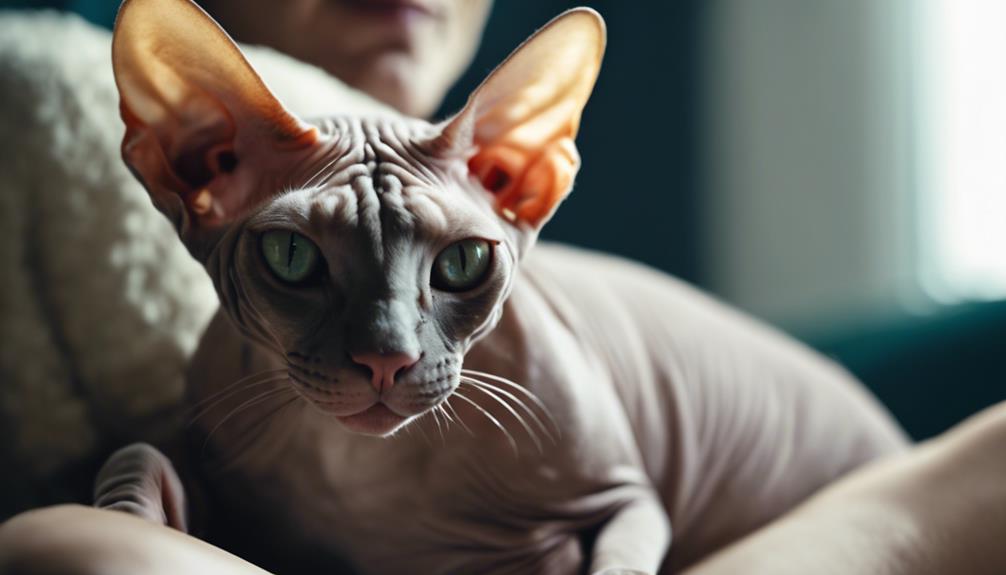
Sphynx cats have a strong need for social interaction and thrive on companionship from both humans and other pets. Their affectionate nature often leads them to seek out constant contact with their owners, making them excellent companions for those who enjoy close bonds with their pets.
Before adopting a Sphynx cat, it's crucial to consider your ability to provide the necessary levels of attention and engagement to meet their social needs.
Socializing With Other Pets
When introducing a Sphynx cat to other pets, gradual socialization through proper introductions is crucial for successful interactions. Sphynx cats' outgoing nature and friendly personalities can help them adapt well to living with other animals in the household.
It's essential to monitor the initial interactions between the Sphynx cat and other pets closely, providing safe spaces for each animal to retreat to if needed. Supervision during these interactions is key to ensuring a harmonious coexistence. Positive reinforcement, such as treats or praise, can also aid in establishing positive relationships over time.
Human Companionship Needs
Seeking constant interaction and attention, Sphynx cats thrive on human companionship and are known for actively engaging in daily activities with their owners. These affectionate cats enjoy cuddling and snuggling, forming strong bonds with their human companions. Sphynx cats can experience stress when left alone for extended periods, making them ideal for individuals seeking a feline companion that craves and reciprocates human interaction and affection.
- Sphynx cats actively seek out their owners for attention and engagement.
- They enjoy participating in daily activities with their human companions.
- Strong bonds form between Sphynx cats and their owners, leading to a desire for constant interaction.
Allergy Sensitivity Awareness
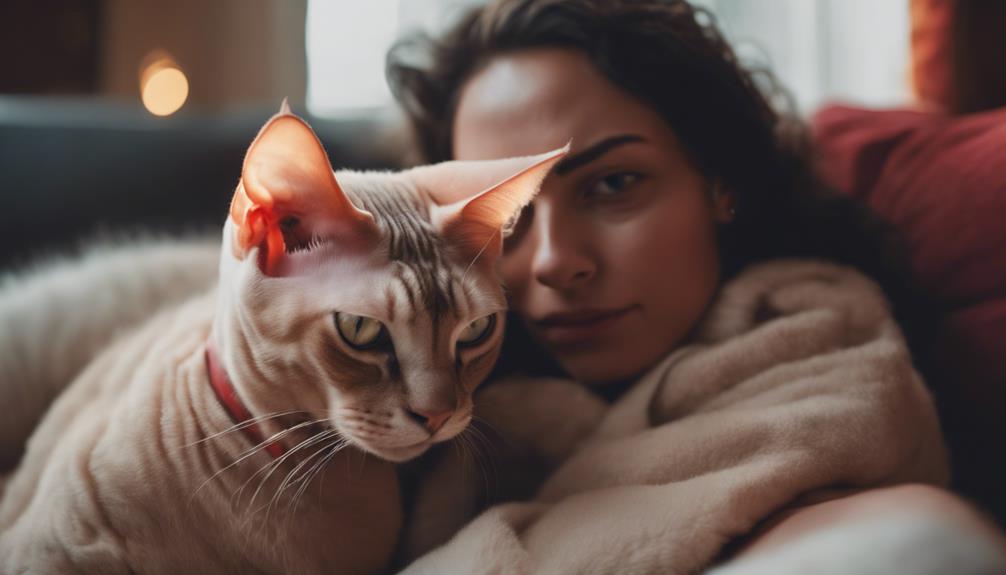
Individuals sensitive to allergens may find relief by considering the unique qualities of Sphynx cats when seeking a feline companion. Sphynx cats, known for being hairless, are often recommended for those with allergies to cat fur. While they aren't completely hypoallergenic, Sphynx cats produce less dander that can trigger allergic reactions compared to other breeds. Their lack of fur can also reduce the overall allergen exposure in the home environment, making them a potential option for allergy sufferers.
To ensure compatibility, individuals with allergy sensitivity should spend time with Sphynx cats before committing to ownership. Regular grooming and cleaning routines for Sphynx cats are essential to minimize allergens in the household. These practices can help reduce the likelihood of triggering allergic reactions in sensitive individuals. By being aware of these factors and taking necessary precautions, individuals with allergies can potentially enjoy the companionship of a Sphynx cat with reduced risk of allergen exposure.
Financial Commitment Evaluation

Considering the financial commitment necessary for owning a Sphynx cat is crucial to adequately provide for their needs and ensure their well-being. Sphynx cats can be quite expensive, with costs ranging from $1,500 to $6,000 from reputable breeders due to their rarity and unique characteristics. Along with the initial investment, ongoing expenses such as grooming supplies, specialized cat food, veterinary care, and potential health issues contribute to the overall financial commitment of owning a Sphynx cat.
To offer proper care and meet their needs effectively, owners should budget for regular grooming sessions, vet visits, and emergency care when necessary. Understanding the financial responsibilities associated with Sphynx cat ownership is essential for providing a high quality of life for these unique feline companions.
- Budgeting for grooming supplies and specialized cat food
- Planning for regular veterinary check-ups and potential emergency care
- Being prepared for ongoing costs related to potential health issues
Health and Wellness Considerations
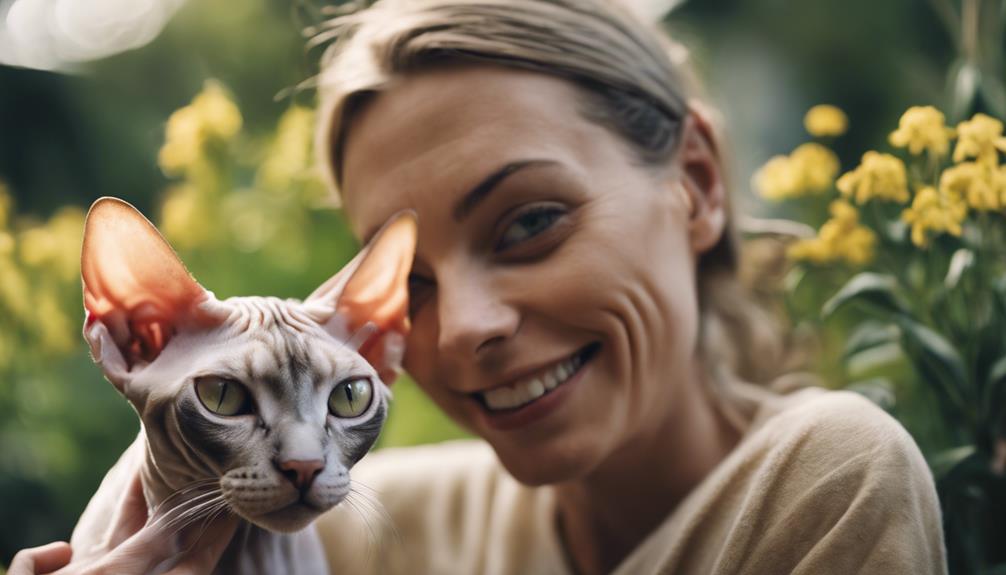
Maintaining the health and wellness of a Sphynx cat involves regular grooming and veterinary check-ups to address potential health issues and ensure their well-being throughout their lifespan. Due to their hairless nature, Sphynx cats require frequent grooming and bathing to prevent skin issues and maintain cleanliness. Regular veterinary visits are essential to monitor for common health issues such as dental disease, oily skin, and heart problems like Hypertrophic Cardiomyopathy (HCM).
Owners considering a Sphynx cat should be aware of potential hereditary conditions like myopathy, which can lead to muscle weakness in these cats. Additionally, the cost of owning a Sphynx cat may include high veterinary expenses, necessitating financial preparedness for their healthcare needs. With an average lifespan of 9-15 years, owning a Sphynx cat is a long-term commitment that requires dedication to their health and well-being.
Time and Attention Commitment
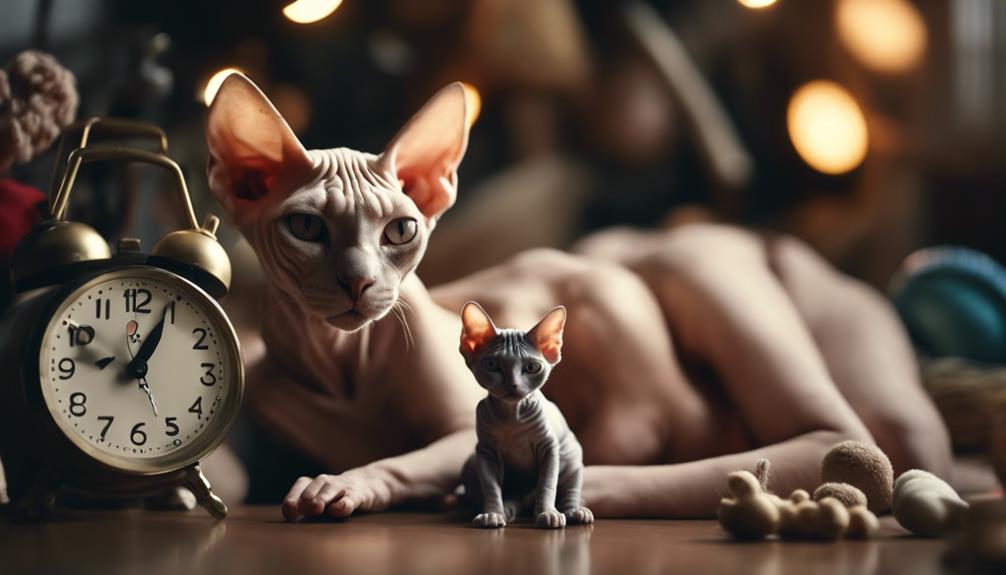
Daily grooming and attention are essential for meeting the unique skin care needs of Sphynx cats. These feline companions require a significant time commitment from their owners to ensure a happy and healthy lifestyle.
Consider the following points before welcoming a Sphynx cat into your home:
- Daily Grooming: Sphynx cats need regular grooming due to their lack of fur, requiring baths to remove excess oils and dirt that would typically be absorbed by fur.
- Playtime and Interaction: These cats thrive on attention and require regular play sessions to keep them mentally stimulated and prevent boredom.
- Health Monitoring: Owners must allocate time for regular vet visits and health check-ups, as Sphynx cats are prone to certain health issues that need early detection and management.
Ensuring you have the time and dedication to provide the necessary care and attention is crucial for a successful companionship with a Sphynx cat.
Frequently Asked Questions
Do Sphynx Cats Need a Companion?
Sphynx cats are social creatures that benefit from companionship. While some may thrive solo, many enjoy feline friendships for added stimulation. Human interaction is crucial, but introducing a compatible cat companion can prevent loneliness and enhance their well-being.
Is It Better to Have 2 Sphynx Cats?
Having two Sphynx cats can be double the trouble but also double the joy. Pair dynamics benefit from increased social interactions, bonding benefits, and companionship considerations. A solo Sphynx may thrive, but two can create a harmonious environment.
Is a Sphynx Cat Right for Me?
A Sphynx cat may be the right choice for someone seeking a warm, interactive feline companion. Their high energy level and need for grooming suit owners who enjoy bonding through playtime and cuddling.
How Much Attention Does a Sphynx Cat Need?
A Sphynx cat requires ample attention due to its need for social interaction, regular playtime, and grooming. Owners should invest time in bonding activities to cater to the cat's high energy levels and ensure a healthy, happy feline.











